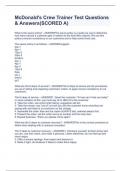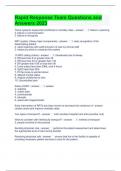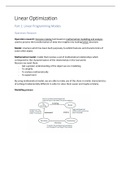In a play where loyalty is rare, Kent is loyalty personified. This renders him a source of
hope as it means that there is some good left in humanity:
(1.1) ‘My life I never held but as a pawn. To wage against thy enemies’
- This suggests Kent’s loyalty is to a king who he believes is worthy of his ultimate sacrifice
and that his own life is of insignificance compared to his lord’s.
(1.1) ‘Be Kent unmannerly when Lear is mad’
- Kent refuses to behave when Lear is acting irresponsibly. His loyalty is such that he is
willing to put himself in a perilous position to stand up for what is right because he values
Lear.
(1.1) ‘Thou dost evil’
- Kent is willing to tell Lear he is committing a moral crime in banishing Cordelia. He
believes a servant’s duty is to preserve his lord’s morality.
EVIDENCE OF KENT’S LOYALTY IN ACTION - Kent’s loyalty is demonstrated by his
unfailing allegiance to his master and his attempts to punish those who dared to violate
the sanctity of the rightful king, casting him as the protector the divine right of kings… -
Christian in pagan world of play + Shakespeare’s audiences were Christian:
(2.2) ‘A knave, a rascal, an eater of broken meats’
- Kent’s unprovoked verbal onslaught on Oswald. Kent is a good servant as he defends
Lear
(2.2) ‘A tailor made thee’
- Kent accuses Oswald of being purely superficial. Oswald is a FOIL to Kent allowing us to
see his loyalty.
However, it could be argued that Kent does not inspire hope as it is his actions appear to
worsen situations due to his lack of political acumen and thus bring out the worst in
humanity:
(2.2) ‘Anger hath a privilege’
- Kent believes interrupting Cornwall is justified. This obstinate attitude ultimately leads
Kent being put into stocks.
(2.2) ‘It’s my occupation to be plain’ + ‘Having more man than wit about me’
- Kent acknowledges acting on impulse has worsened the problem.
It is worth noting that Kent is not the only character who inspires hope in the bleak and
nihilistic world of the play, but other characters who symbolise Christianity, whether that
be Edgar’s representation of restoration or Cordelia’s Christ-like behaviour:
Cordelia:
(1.1) ‘Love well our father’
- It appears Cordelia has already forgiven Lear (Christ-like). This is remarkable as his
actions only appeared, thus far, egotistical, irrational and selfish.
(4.3) ‘Holy water from her heavenly eyes’
- This suggests the possible redemptive quality she may bring to the action of the play
upon her return to Britain.
(4.7) ‘Hold your hands in Benediction above me’
, - Cordelia is aligned with Christian values which are set against the Pagan world of the play.
This echoes Matthew - ‘turn the other cheek’.
(5.3) ‘For thee oppressed king I am cast down’
- Cordelia is willing to sacrifice herself for Lear, showing her Christian virtues.
Edgar:
Gloucester:
(4.6) ‘This world I do renounce and in your sights / Shake patiently my great affliction off’
- In Christianity, suicide is a sin, so Edgar is saving Gloucester from eternal purgatorial
damnation.
(4.6) ‘The crowns and choughs…show scarce so gross as beetles…one that gather samphire’
- Edgar describing the ‘cliff-edge’ here creates a theatrical experience for Gloucester.
Theatre is a predominantly aural experience.
(4.6) ‘Why do I trifle thus with his despair is done to cure it’
- Edgar reveals his plan to alleviate Gloucester’s misery.
(4.6) ‘Henceforth I’ll bear affliction…’
- Edgar is a restorative figure as Gloucester is ‘cured’ of his despair.
Lear:
(2.2) ‘Edgar i nothing am’
- Edgar loses his identity and becomes a Bedlam beggar (‘preserve myself’). Whilst Edmund
uses theatrical artifice to manipulate, Edgar uses it to survive. Anacoluthon reflects the
loss of cohesion in his life. Legatt - ‘Tom is a more vivid and recognizable character than
Edgar…he is truly outside society’.
(3.4) ‘O I have ta’en too little care of this’
- Lear recognises his failures to attend to the ‘poor naked wretches’ who suffer in the storm.
He is forced to ‘feel what wretches feel’ creating an empathetic connection. Greenblatt -
‘he is a ruler who is unable to perceive, let alone address, the needs of his people’.
(3.4) ‘Is man no more than this ?…thou art the thing itself’
- Lear’s understanding becomes expansive as he sees Poor Tom as emblematic of human
condition, a phenomenology of man. Poor Tom represents man’s essential state.
(3.4) ‘Off, off you lendings’
- Lear’s undressing is a metaphor of the essential state of humanity. He wishes to shake off
all forms of artifice.
, The contrast between Kent and Oswald only furthers our sense of Kent’s bravery and
devotion. TWEDYA?
They are foils, a comparison between these two characters is instinctual.
Oswald is pathetic as he blindly follows Goneril as a subservient lackey:
(1.3) ‘Put on what weary negligence you please’
- Goneril instructs Oswald to be hostile towards Lear, in which Oswald unquestioningly
follows (‘Ay madam…very well madam’). This indecency towards guests is problematic as
it goes against the ancient Greek hospitality rite of xenia.
(1.4) ‘My lady’s father’
- Oswald insults Lear. This is a shocking denigration, something which we see Lear
enraged by.
(1.4) ‘Base football player’
- Oswald’s behaviour sees Kent insult and trip him. When Goneril finds out she reduces
Lear’s knights as they are behaving out of control.
This creates a contrast and exacerbates Kent’s bravery and devotion as he is not blindly
loyal, but loyal to the extent that he will oppose Lear if it is in his best interest, both
politically and morally:
(1.1) ‘My life I never held but as a pawn. To wage against thy enemies’
- This suggests Kent’s loyalty is to a king who he believes is worthy of his ultimate sacrifice
and that his own life is of insignificance compared to his lord’s.
(1.1) ‘Be Kent unmannerly when Lear is mad’
- Kent refuses to behave when Lear is acting irresponsibly. His loyalty is such that he is
willing to put himself in a perilous position to stand up for what is right because he values
Lear.
(1.1) ‘Thou dost evil’
- Kent is willing to tell Lear he is committing a moral crime in banishing Cordelia. He
believes a servant’s duty is to preserve his lord’s morality.
Oswald is pathetic once again as he provokes Kent’s righteous indignation because he
wants to see him punished:
(2.2) ‘You come with letters against the king’
(2.2) ‘A knave, a rascal, an eater of broken meats’
- Kent’s unprovoked verbal onslaught on Oswald. Kent is a good servant as he defends
Lear
(2.2) ‘Bring forth the stocks’ + ‘They durst not do it, could not do it, would not do it’
- Kent has been put into the stocks as Oswald’s behaviour offered triggered a reaction,
which served as justification. Lear is in disbelief.
Whilst this is pathetic of Oswald, it draws attention, once again, to Kent’s bravery and
devotion as he attempts to punish anyone who dared to violate the sanctity of the
rightful king:




